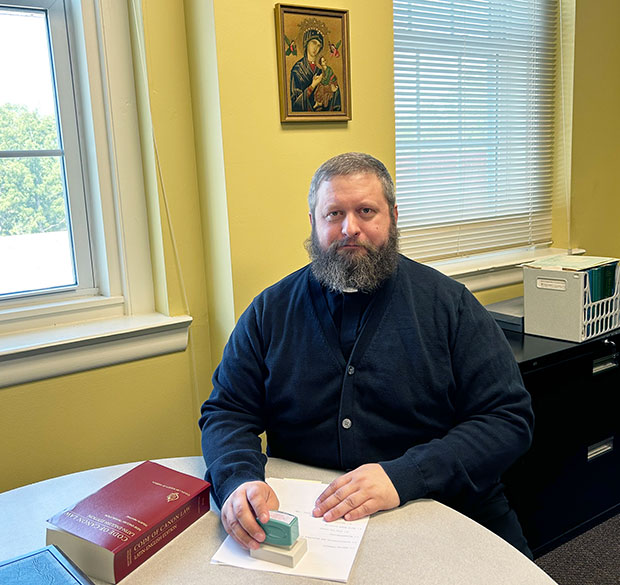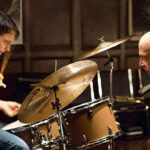
Father Paul Appel, judicial vicar, stamps paperwork in the Tribunal office.
(Editor’s note: The Catholic Messenger is publishing a series on the Tribunal of the Diocese of Davenport. This is the fourth article, written by Father Paul Appel, the diocese’s judicial vicar.)
Previously we saw how an annulment case is started and evidence is gathered. We also heard from some people about their own experience in this process. In concluding our series, I thought it would be helpful to hear from me, as a judge, how the case is deliberated and how anyone can come to a conclusion about something as important as the sacramental nature of a marriage.
First, I would like every Catholic in our diocese to know how seriously I and the other Tribunal staff members take this responsibility. We know that the information shared with us is to be kept strictly confidential. Second, we all take time to pray during the day and call upon the intercession of Mary and the saints frequently during the process. We ask God to bless all parties to the cases and even pray over the files entrusted to our care. Finally, I know that the judgements I make have everlasting consequences and can make an enormous difference in a person’s life.
When we sit down to decide a case, the first thing a judge must do is understand the law itself. Canon law clearly defines the nature of marriage in the Catholic Church. From long experience and informed by Scripture, we know that certain things belong in a marriage and certain things do not. As a result, we can examine any marriage and check off whether good things are lacking or bad things are present. Christian marriage requires such things as unity, fidelity, permanence, openness to children and faith. The parties must also have the capability to know and live out these things in the context of married life. An annulment is simply a statement that declares a sacrament did not take place because one of these important things was lacking at the time of consent.
When I examine the evidence, I am looking for witness statements and official documents that provide proof. For instance, testimony from several witnesses who state that a party to the marriage never intended to remain faithful goes a long way to proving that he or she withheld fidelity from their consent. Likewise, a series of arrest records for drunken driving or orders to attend substance abuse counseling might prove that alcoholism prevented a person from ever taking on the obligations of matrimony.
No matter what set of grounds is chosen on which to decide the case, we are looking for evidence to support the claim. One of the most frustrating things we deal with in this process is when people don’t want to share the whole truth because they want to be “Iowa nice” and not speak ill of others. However, it is not sinful to simply tell the truth. If you ever receive a questionnaire for one of our cases, we are asking you only to be honest with your recollection. Another frustration occurs when parties take so long to address the case that all the witnesses have gone to their eternal reward and no evidence can be found.
Once all of the evidence is gathered, I take time to read through it once again, offer the parties a chance to review it themselves, and then analyze the evidence in light of the law. I will present the evidence in a clear, logical fashion before making a decision. Once notified of the decision, the parties are allowed to make an appeal. Hearing no appeal, the decision — whether to grant or deny an annulment — becomes final. If the annulment is affirmed, a decree is issued noting that the parties are no longer bound by this union. This ends the case for the parties involved and many of them choose to move on and attempt marriage once again.
However, this is not the end of the process for the judge. I firmly believe that on the Last Day (my judgement before the throne of God) I will have to answer for the decisions I made while serving at the Tribunal. I hope that I will be able to defend all of them successfully. I ask that all of you reading this article today pray that God will guide me and the other judges in this process that we get it right and serve as humble ministers of the Law of God. May God bless you all.











